Analysis of Aspirin's Efficacy in Acute Coronary Syndrome Treatment
VerifiedAdded on 2022/12/15
|6
|1149
|350
Report
AI Summary
This report delves into the efficacy of aspirin in treating acute coronary syndrome (ACS). It highlights aspirin's mechanism of action, which includes inhibiting platelet activation and aggregation, crucial in ACS. The report discusses both short-term goals, such as pain relief and improved blood flow, and long-term objectives, including enhanced heart function and risk factor management. It also examines how aspirin affects the COX-dependent vasoconstrictors, endothelial function, and the inflammatory response. The report emphasizes the importance of lifestyle changes alongside medication and concludes that aspirin, when combined with a healthy lifestyle, significantly benefits patients diagnosed with ACS. The report also mentions the importance of consulting a doctor before taking this medicine.
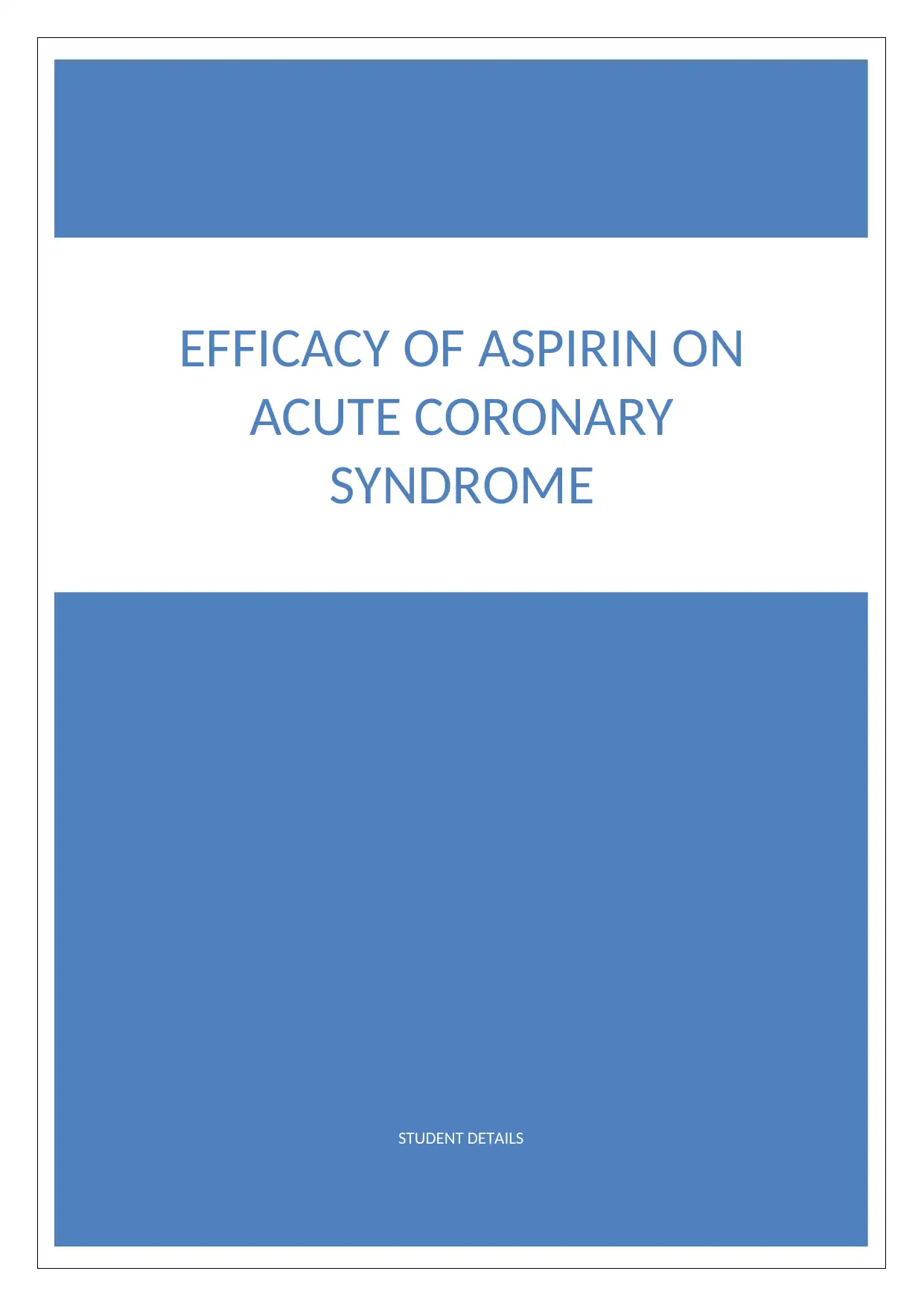
STUDENT DETAILS
EFFICACY OF ASPIRIN ON
ACUTE CORONARY
SYNDROME
EFFICACY OF ASPIRIN ON
ACUTE CORONARY
SYNDROME
Paraphrase This Document
Need a fresh take? Get an instant paraphrase of this document with our AI Paraphraser
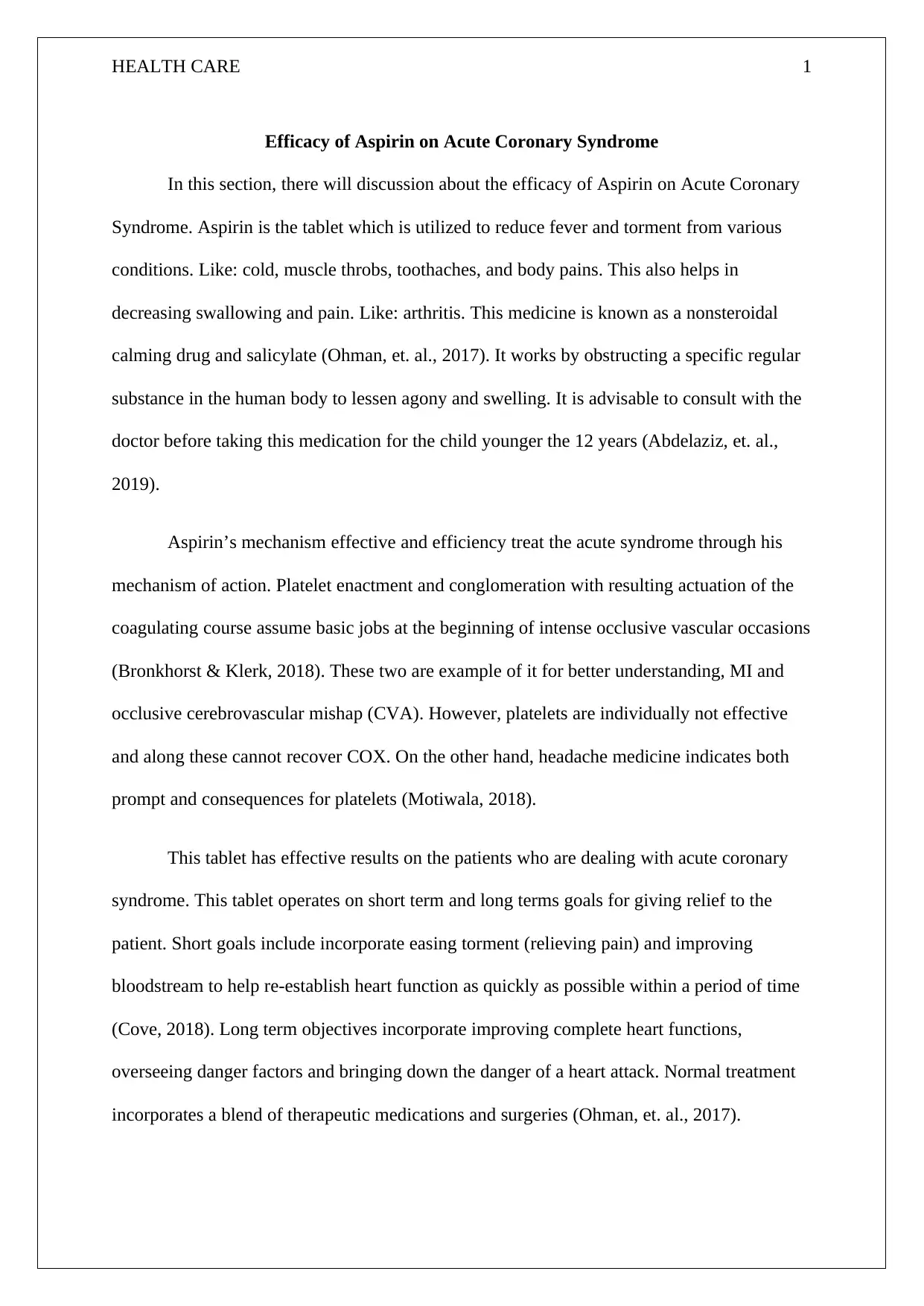
HEALTH CARE 1
Efficacy of Aspirin on Acute Coronary Syndrome
In this section, there will discussion about the efficacy of Aspirin on Acute Coronary
Syndrome. Aspirin is the tablet which is utilized to reduce fever and torment from various
conditions. Like: cold, muscle throbs, toothaches, and body pains. This also helps in
decreasing swallowing and pain. Like: arthritis. This medicine is known as a nonsteroidal
calming drug and salicylate (Ohman, et. al., 2017). It works by obstructing a specific regular
substance in the human body to lessen agony and swelling. It is advisable to consult with the
doctor before taking this medication for the child younger the 12 years (Abdelaziz, et. al.,
2019).
Aspirin’s mechanism effective and efficiency treat the acute syndrome through his
mechanism of action. Platelet enactment and conglomeration with resulting actuation of the
coagulating course assume basic jobs at the beginning of intense occlusive vascular occasions
(Bronkhorst & Klerk, 2018). These two are example of it for better understanding, MI and
occlusive cerebrovascular mishap (CVA). However, platelets are individually not effective
and along these cannot recover COX. On the other hand, headache medicine indicates both
prompt and consequences for platelets (Motiwala, 2018).
This tablet has effective results on the patients who are dealing with acute coronary
syndrome. This tablet operates on short term and long terms goals for giving relief to the
patient. Short goals include incorporate easing torment (relieving pain) and improving
bloodstream to help re-establish heart function as quickly as possible within a period of time
(Cove, 2018). Long term objectives incorporate improving complete heart functions,
overseeing danger factors and bringing down the danger of a heart attack. Normal treatment
incorporates a blend of therapeutic medications and surgeries (Ohman, et. al., 2017).
Efficacy of Aspirin on Acute Coronary Syndrome
In this section, there will discussion about the efficacy of Aspirin on Acute Coronary
Syndrome. Aspirin is the tablet which is utilized to reduce fever and torment from various
conditions. Like: cold, muscle throbs, toothaches, and body pains. This also helps in
decreasing swallowing and pain. Like: arthritis. This medicine is known as a nonsteroidal
calming drug and salicylate (Ohman, et. al., 2017). It works by obstructing a specific regular
substance in the human body to lessen agony and swelling. It is advisable to consult with the
doctor before taking this medication for the child younger the 12 years (Abdelaziz, et. al.,
2019).
Aspirin’s mechanism effective and efficiency treat the acute syndrome through his
mechanism of action. Platelet enactment and conglomeration with resulting actuation of the
coagulating course assume basic jobs at the beginning of intense occlusive vascular occasions
(Bronkhorst & Klerk, 2018). These two are example of it for better understanding, MI and
occlusive cerebrovascular mishap (CVA). However, platelets are individually not effective
and along these cannot recover COX. On the other hand, headache medicine indicates both
prompt and consequences for platelets (Motiwala, 2018).
This tablet has effective results on the patients who are dealing with acute coronary
syndrome. This tablet operates on short term and long terms goals for giving relief to the
patient. Short goals include incorporate easing torment (relieving pain) and improving
bloodstream to help re-establish heart function as quickly as possible within a period of time
(Cove, 2018). Long term objectives incorporate improving complete heart functions,
overseeing danger factors and bringing down the danger of a heart attack. Normal treatment
incorporates a blend of therapeutic medications and surgeries (Ohman, et. al., 2017).
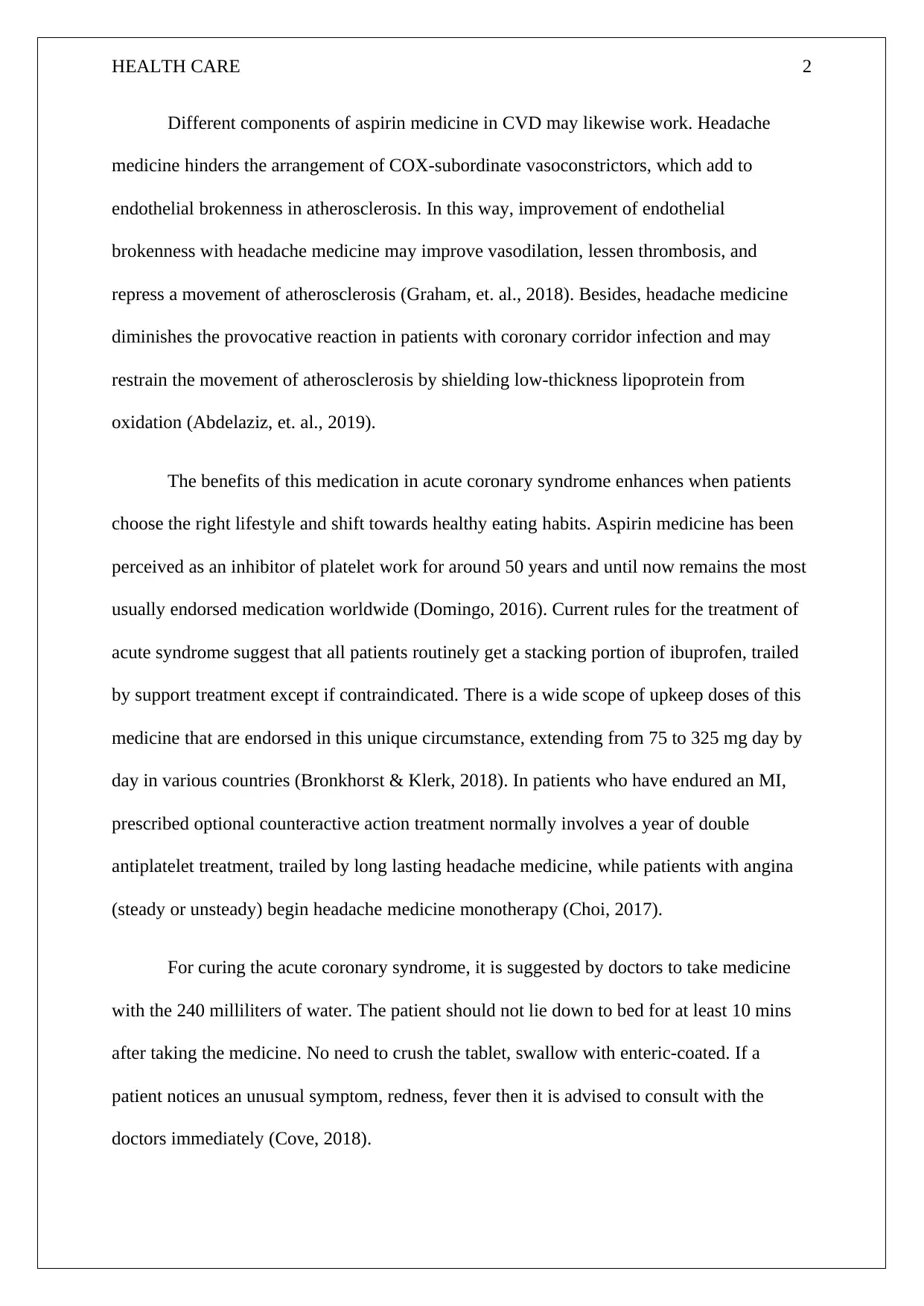
HEALTH CARE 2
Different components of aspirin medicine in CVD may likewise work. Headache
medicine hinders the arrangement of COX-subordinate vasoconstrictors, which add to
endothelial brokenness in atherosclerosis. In this way, improvement of endothelial
brokenness with headache medicine may improve vasodilation, lessen thrombosis, and
repress a movement of atherosclerosis (Graham, et. al., 2018). Besides, headache medicine
diminishes the provocative reaction in patients with coronary corridor infection and may
restrain the movement of atherosclerosis by shielding low-thickness lipoprotein from
oxidation (Abdelaziz, et. al., 2019).
The benefits of this medication in acute coronary syndrome enhances when patients
choose the right lifestyle and shift towards healthy eating habits. Aspirin medicine has been
perceived as an inhibitor of platelet work for around 50 years and until now remains the most
usually endorsed medication worldwide (Domingo, 2016). Current rules for the treatment of
acute syndrome suggest that all patients routinely get a stacking portion of ibuprofen, trailed
by support treatment except if contraindicated. There is a wide scope of upkeep doses of this
medicine that are endorsed in this unique circumstance, extending from 75 to 325 mg day by
day in various countries (Bronkhorst & Klerk, 2018). In patients who have endured an MI,
prescribed optional counteractive action treatment normally involves a year of double
antiplatelet treatment, trailed by long lasting headache medicine, while patients with angina
(steady or unsteady) begin headache medicine monotherapy (Choi, 2017).
For curing the acute coronary syndrome, it is suggested by doctors to take medicine
with the 240 milliliters of water. The patient should not lie down to bed for at least 10 mins
after taking the medicine. No need to crush the tablet, swallow with enteric-coated. If a
patient notices an unusual symptom, redness, fever then it is advised to consult with the
doctors immediately (Cove, 2018).
Different components of aspirin medicine in CVD may likewise work. Headache
medicine hinders the arrangement of COX-subordinate vasoconstrictors, which add to
endothelial brokenness in atherosclerosis. In this way, improvement of endothelial
brokenness with headache medicine may improve vasodilation, lessen thrombosis, and
repress a movement of atherosclerosis (Graham, et. al., 2018). Besides, headache medicine
diminishes the provocative reaction in patients with coronary corridor infection and may
restrain the movement of atherosclerosis by shielding low-thickness lipoprotein from
oxidation (Abdelaziz, et. al., 2019).
The benefits of this medication in acute coronary syndrome enhances when patients
choose the right lifestyle and shift towards healthy eating habits. Aspirin medicine has been
perceived as an inhibitor of platelet work for around 50 years and until now remains the most
usually endorsed medication worldwide (Domingo, 2016). Current rules for the treatment of
acute syndrome suggest that all patients routinely get a stacking portion of ibuprofen, trailed
by support treatment except if contraindicated. There is a wide scope of upkeep doses of this
medicine that are endorsed in this unique circumstance, extending from 75 to 325 mg day by
day in various countries (Bronkhorst & Klerk, 2018). In patients who have endured an MI,
prescribed optional counteractive action treatment normally involves a year of double
antiplatelet treatment, trailed by long lasting headache medicine, while patients with angina
(steady or unsteady) begin headache medicine monotherapy (Choi, 2017).
For curing the acute coronary syndrome, it is suggested by doctors to take medicine
with the 240 milliliters of water. The patient should not lie down to bed for at least 10 mins
after taking the medicine. No need to crush the tablet, swallow with enteric-coated. If a
patient notices an unusual symptom, redness, fever then it is advised to consult with the
doctors immediately (Cove, 2018).
⊘ This is a preview!⊘
Do you want full access?
Subscribe today to unlock all pages.

Trusted by 1+ million students worldwide
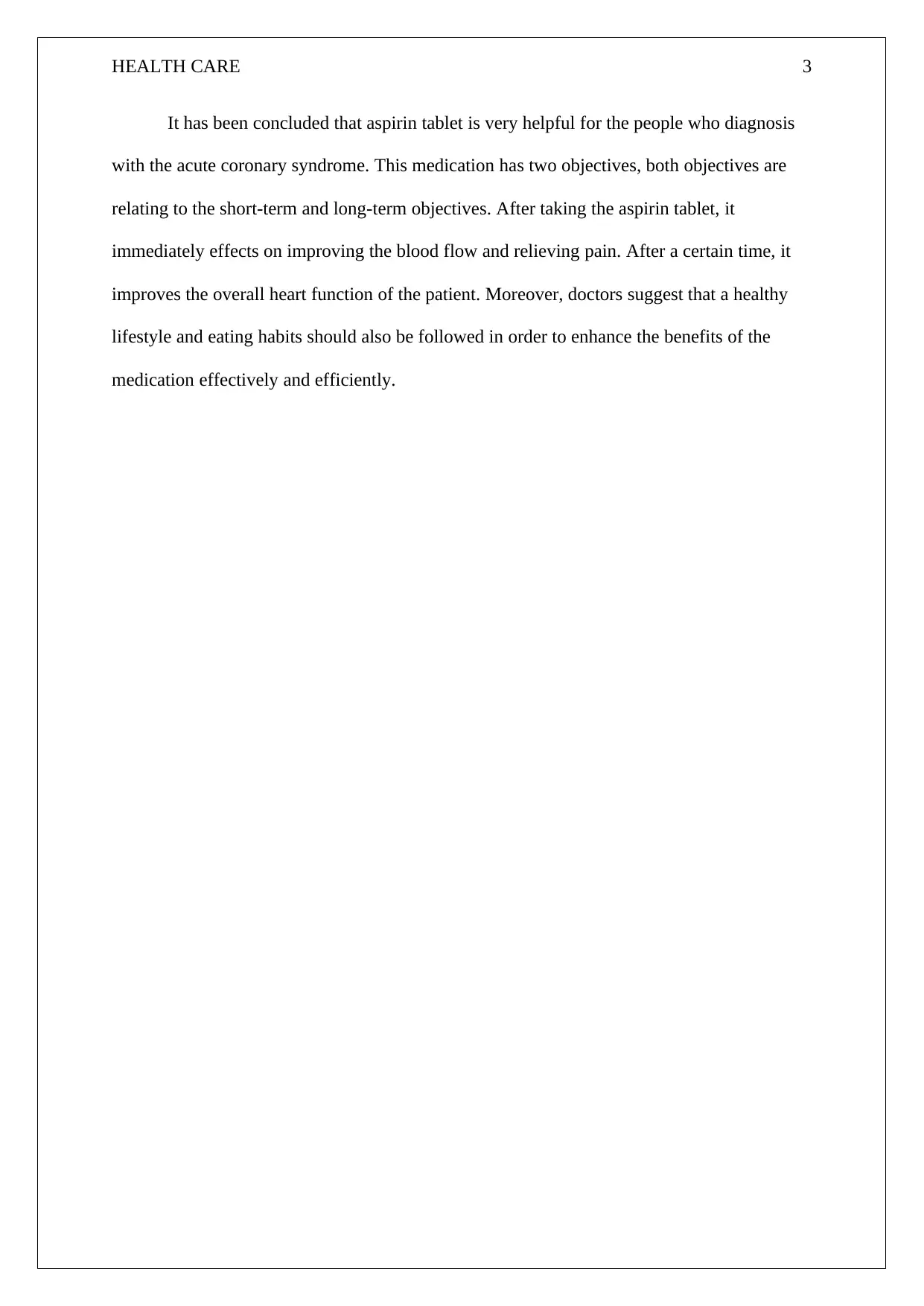
HEALTH CARE 3
It has been concluded that aspirin tablet is very helpful for the people who diagnosis
with the acute coronary syndrome. This medication has two objectives, both objectives are
relating to the short-term and long-term objectives. After taking the aspirin tablet, it
immediately effects on improving the blood flow and relieving pain. After a certain time, it
improves the overall heart function of the patient. Moreover, doctors suggest that a healthy
lifestyle and eating habits should also be followed in order to enhance the benefits of the
medication effectively and efficiently.
It has been concluded that aspirin tablet is very helpful for the people who diagnosis
with the acute coronary syndrome. This medication has two objectives, both objectives are
relating to the short-term and long-term objectives. After taking the aspirin tablet, it
immediately effects on improving the blood flow and relieving pain. After a certain time, it
improves the overall heart function of the patient. Moreover, doctors suggest that a healthy
lifestyle and eating habits should also be followed in order to enhance the benefits of the
medication effectively and efficiently.
Paraphrase This Document
Need a fresh take? Get an instant paraphrase of this document with our AI Paraphraser
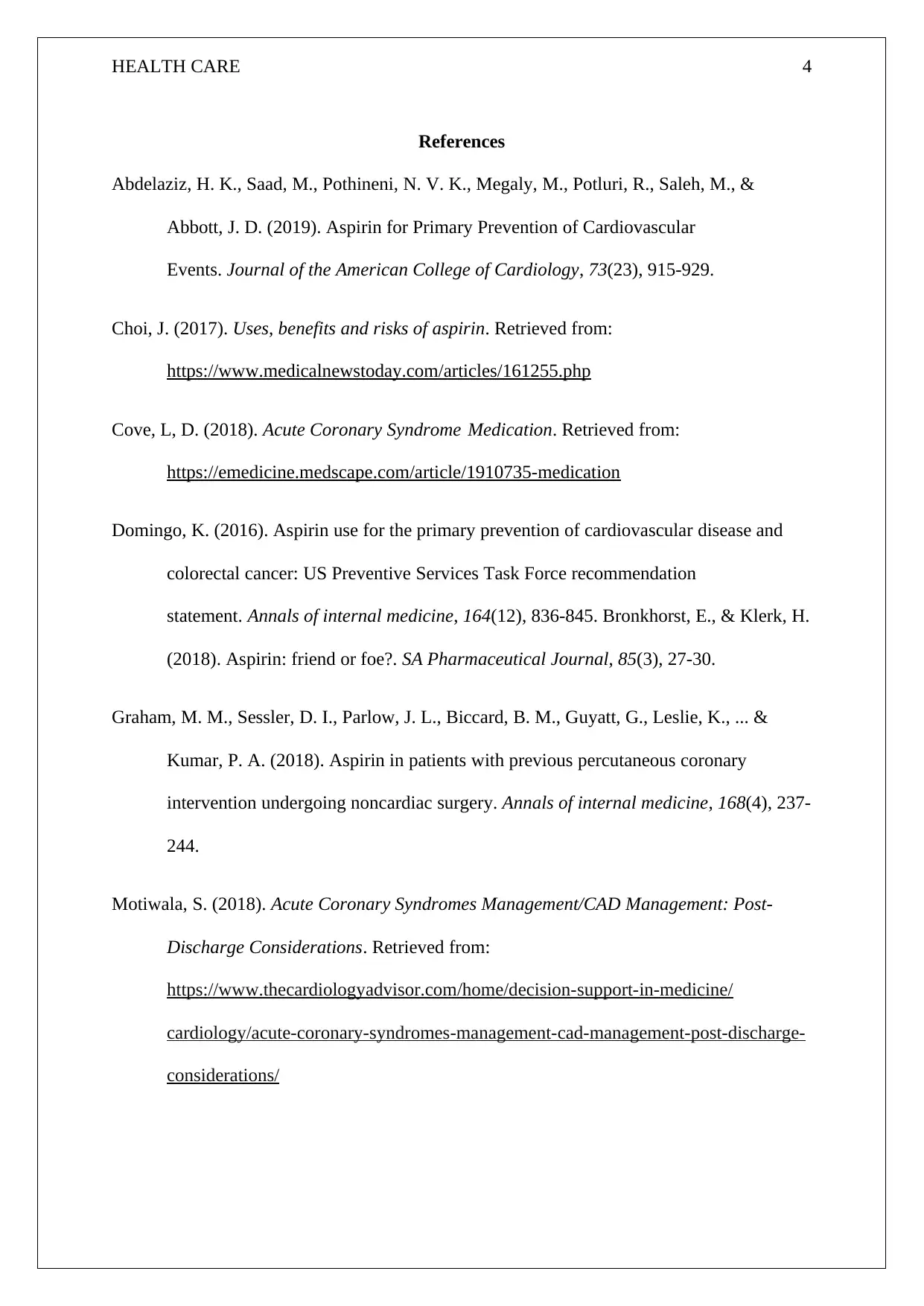
HEALTH CARE 4
References
Abdelaziz, H. K., Saad, M., Pothineni, N. V. K., Megaly, M., Potluri, R., Saleh, M., &
Abbott, J. D. (2019). Aspirin for Primary Prevention of Cardiovascular
Events. Journal of the American College of Cardiology, 73(23), 915-929.
Choi, J. (2017). Uses, benefits and risks of aspirin. Retrieved from:
https://www.medicalnewstoday.com/articles/161255.php
Cove, L, D. (2018). Acute Coronary Syndrome Medication. Retrieved from:
https://emedicine.medscape.com/article/1910735-medication
Domingo, K. (2016). Aspirin use for the primary prevention of cardiovascular disease and
colorectal cancer: US Preventive Services Task Force recommendation
statement. Annals of internal medicine, 164(12), 836-845. Bronkhorst, E., & Klerk, H.
(2018). Aspirin: friend or foe?. SA Pharmaceutical Journal, 85(3), 27-30.
Graham, M. M., Sessler, D. I., Parlow, J. L., Biccard, B. M., Guyatt, G., Leslie, K., ... &
Kumar, P. A. (2018). Aspirin in patients with previous percutaneous coronary
intervention undergoing noncardiac surgery. Annals of internal medicine, 168(4), 237-
244.
Motiwala, S. (2018). Acute Coronary Syndromes Management/CAD Management: Post-
Discharge Considerations. Retrieved from:
https://www.thecardiologyadvisor.com/home/decision-support-in-medicine/
cardiology/acute-coronary-syndromes-management-cad-management-post-discharge-
considerations/
References
Abdelaziz, H. K., Saad, M., Pothineni, N. V. K., Megaly, M., Potluri, R., Saleh, M., &
Abbott, J. D. (2019). Aspirin for Primary Prevention of Cardiovascular
Events. Journal of the American College of Cardiology, 73(23), 915-929.
Choi, J. (2017). Uses, benefits and risks of aspirin. Retrieved from:
https://www.medicalnewstoday.com/articles/161255.php
Cove, L, D. (2018). Acute Coronary Syndrome Medication. Retrieved from:
https://emedicine.medscape.com/article/1910735-medication
Domingo, K. (2016). Aspirin use for the primary prevention of cardiovascular disease and
colorectal cancer: US Preventive Services Task Force recommendation
statement. Annals of internal medicine, 164(12), 836-845. Bronkhorst, E., & Klerk, H.
(2018). Aspirin: friend or foe?. SA Pharmaceutical Journal, 85(3), 27-30.
Graham, M. M., Sessler, D. I., Parlow, J. L., Biccard, B. M., Guyatt, G., Leslie, K., ... &
Kumar, P. A. (2018). Aspirin in patients with previous percutaneous coronary
intervention undergoing noncardiac surgery. Annals of internal medicine, 168(4), 237-
244.
Motiwala, S. (2018). Acute Coronary Syndromes Management/CAD Management: Post-
Discharge Considerations. Retrieved from:
https://www.thecardiologyadvisor.com/home/decision-support-in-medicine/
cardiology/acute-coronary-syndromes-management-cad-management-post-discharge-
considerations/
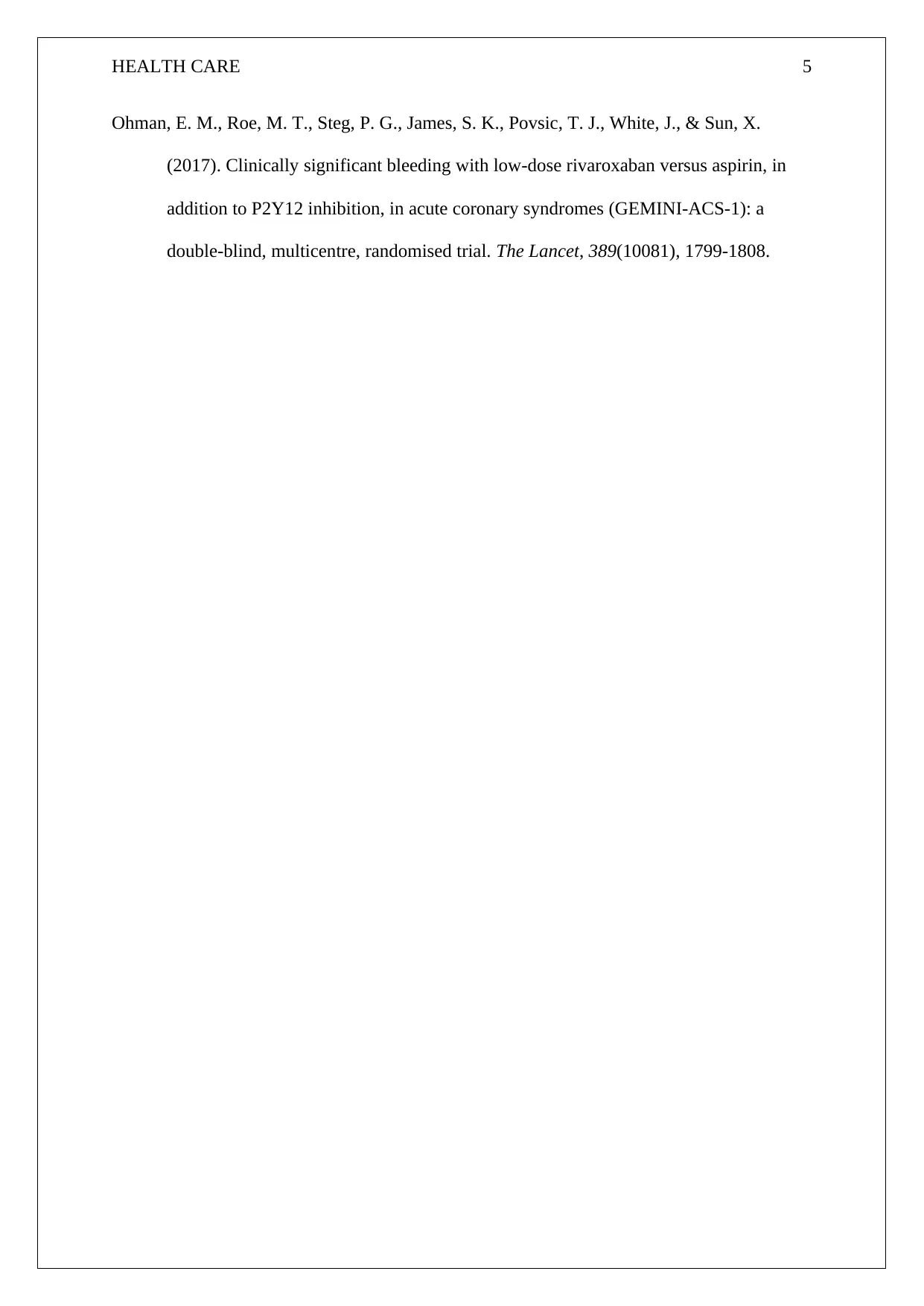
HEALTH CARE 5
Ohman, E. M., Roe, M. T., Steg, P. G., James, S. K., Povsic, T. J., White, J., & Sun, X.
(2017). Clinically significant bleeding with low-dose rivaroxaban versus aspirin, in
addition to P2Y12 inhibition, in acute coronary syndromes (GEMINI-ACS-1): a
double-blind, multicentre, randomised trial. The Lancet, 389(10081), 1799-1808.
Ohman, E. M., Roe, M. T., Steg, P. G., James, S. K., Povsic, T. J., White, J., & Sun, X.
(2017). Clinically significant bleeding with low-dose rivaroxaban versus aspirin, in
addition to P2Y12 inhibition, in acute coronary syndromes (GEMINI-ACS-1): a
double-blind, multicentre, randomised trial. The Lancet, 389(10081), 1799-1808.
⊘ This is a preview!⊘
Do you want full access?
Subscribe today to unlock all pages.

Trusted by 1+ million students worldwide
1 out of 6
Your All-in-One AI-Powered Toolkit for Academic Success.
+13062052269
info@desklib.com
Available 24*7 on WhatsApp / Email
![[object Object]](/_next/static/media/star-bottom.7253800d.svg)
Unlock your academic potential
Copyright © 2020–2026 A2Z Services. All Rights Reserved. Developed and managed by ZUCOL.

